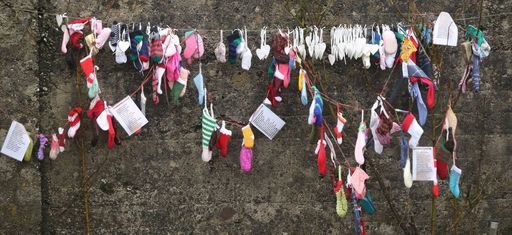Calls for public inquiry as NI mother and baby home numbers ‘significantly higher’ than first thought
'Stormont has ignored victims' calls for an inquiry for years,' say campaigners

Your support helps us to tell the story
From reproductive rights to climate change to Big Tech, The Independent is on the ground when the story is developing. Whether it's investigating the financials of Elon Musk's pro-Trump PAC or producing our latest documentary, 'The A Word', which shines a light on the American women fighting for reproductive rights, we know how important it is to parse out the facts from the messaging.
At such a critical moment in US history, we need reporters on the ground. Your donation allows us to keep sending journalists to speak to both sides of the story.
The Independent is trusted by Americans across the entire political spectrum. And unlike many other quality news outlets, we choose not to lock Americans out of our reporting and analysis with paywalls. We believe quality journalism should be available to everyone, paid for by those who can afford it.
Your support makes all the difference.The number of women taken into mother and baby homes in Northern Ireland is "significantly" higher than first thought, it has emerged.
The Northern Irish executive in 2017 commissioned an interdepartmental working group to conduct research on the homes and Magdalene Laundries across the country.
Records suggested that some 7,500 women and girls gave birth in the facilities, which were run by Catholic and Protestant churches as well as other religious organisations. The last one closed in 1990.
But the chair of that working group, former Police Service of Northern Ireland (PSNI) deputy chief constable Judith Gillespie, said on Thursday she expects the number to be much higher.
A research report by university academics has been completed, and Ms Gillespie's group is set to make recommendations to Stormont ministers before the end of the month.
But calls for a public inquiry are already growing.
Patrick Corrigan, Northern Ireland programme director of Amnesty International, said he has "no doubt" that the total number of those who went through the centres will be far higher than 7,500.
He is calling on the NI executive to go further than commissioning research and a working group, urging ministers to announce a full public inquiry.
Mr Corrigan said: "Women have told us that they suffered arbitrary detention, forced labour, ill-treatment, and the removal and forced adoption of their babies — criminal acts in both domestic and international law".
"In 2013, Amnesty submitted a paper to the executive making the case for a public inquiry into abuses in these homes.
"Stormont has ignored victims' calls for an inquiry for years. The executive must deliver a human rights compliant investigation into the allegations of systemic human rights abuses at these institutions, and give an apology and redress to those who suffered irreparable damage to their lives".
Foyle MP and SDLP leader Colum Eastwood also called on ministers to act, saying a public inquiry was "long overdue".
He said: "It is unacceptable that survivors of these institutions continue to experience unjustifiable delay that compounds the pain they have to live with.
“The truth is that our society, through institutions of faith and the state, exercised a coercive control over new mothers and their babies. The experiences of forced adoption, detention and physical labour are chilling and cannot go unchallenged".
He added: "The invasive and pervasive puritanical attitude that allowed these acts, some of them clearly criminal in character, was inflicted on these women and their children by a narrow, close-minded society.
"The society that we have become today, and must continue to evolve into, must offer truth, justice and accountability to these survivors. And we must offer them a full apology for their experience. The executive should move quickly to publish the research report and then call a full public inquiry."
Calls for an inquiry came after the Republic of Ireland government apologised after an investigation into homes there uncovered an "appalling level of infant mortality".
Some 9,000 children died in the 18 homes the state investigated.
Both Sinn Féin and the DUP, NI's two largest parties and power-sharing partners, have said they will take recommendations from the working group before moving forward.
First and deputy first ministers Arlene Forster and Michelle O'Neill are set to meet with Irish children’s minister Roderic O’Gorman next week to consider “any issues which have a cross-border dimension”.
Additional reporting by Associated Press



Join our commenting forum
Join thought-provoking conversations, follow other Independent readers and see their replies
Comments